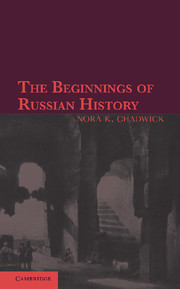Book contents
- Frontmatter
- Dedication
- Epigraph
- Contents
- Preface
- Chapter I The Early Records
- Chapter II The Early History of Kiev
- Chapter III Greek and Oriental Evidence
- Chapter IV Vladimir I
- Chapter V The Treaties with the Greeks, and Russian Heathenism
- Chapter VI Yaroslav the Wise
- Chapter VII Voevoda and Kormilets
- Chapter VIII Vladimir Monomakh
- Appendix I Extract from Ibn Miskawaih, in The Eclipse of the 'Abbasid Caliphate, Vol. v. Translated from the Arabic by D. S. Margoliouth
- Appendix II The Scandinavian Background: Oddr Víth-förli (Örvar-Oddr)
- Index
Chapter I - The Early Records
Published online by Cambridge University Press: 05 June 2016
- Frontmatter
- Dedication
- Epigraph
- Contents
- Preface
- Chapter I The Early Records
- Chapter II The Early History of Kiev
- Chapter III Greek and Oriental Evidence
- Chapter IV Vladimir I
- Chapter V The Treaties with the Greeks, and Russian Heathenism
- Chapter VI Yaroslav the Wise
- Chapter VII Voevoda and Kormilets
- Chapter VIII Vladimir Monomakh
- Appendix I Extract from Ibn Miskawaih, in The Eclipse of the 'Abbasid Caliphate, Vol. v. Translated from the Arabic by D. S. Margoliouth
- Appendix II The Scandinavian Background: Oddr Víth-förli (Örvar-Oddr)
- Index
Summary
The fascination of Russian studies relating to the early period of the national life lies largely in the fact that the records are in a state of transition between legend and history. They are quite different in character from the early historical writings of Scandinavian lands, where annalistic history, with its exact chronology, is unknown. On the other hand they differ essentially from our own Anglo-Saxon Chronicle, in which the element of saga is reduced to a minimum, and of which the annals appear to be virtually independent of panegyric or heroic poetry. The earliest Russian records have made use of practically every form of historical source—saga and heroic poetry, biography, annals, the reports of eyewitnesses, legal documents, such as international treaties, even the written records of books. All these sources of information have been utilised by the compiler; and surely no chronicler ever showed himself more liberal and more imaginative in the best sense of the word in the collection of his materials, or more skilled and constructive in his use of them to build up a vivid and readable, and, in general, dignified and convincing picture of a nation's history.
The earliest Russian historical records are embodied in a written chronicle, composed, like most medieval historical works, in monastic circles. It was almost certainly written in a monastery in Kiev, whether as a single or a composite work. Its form is roughly annalistic. This annalistic form is derived ultimately from the Eusebian tables; but the more immediate form of the chronicle was doubtless directly suggested by other similar chronicles composed during the Dark and the Middle Ages on contemporary Greek and Latin models. The individuality of the Russian chronicle lies in the freedom with which the compiler intersperses his laconic entries with extended and vivid narratives, often amounting to complete short stories on historical subjects, and at times showing clearly that they are derived from ambitious oral narratives of a highly elaborate and artistic nature. Such entries are made under the years to which they are relevant, so that the annalistic form is still retained, though utilised as the merest skeleton, and enriched with every kind of matter which the compiler could find bearing upon his subject, not excluding lengthy quotations from the scriptures and hagiological writings.
- Type
- Chapter
- Information
- The Beginnings of Russian HistoryAn Enquiry into Sources, pp. 1 - 16Publisher: Cambridge University PressPrint publication year: 2013

